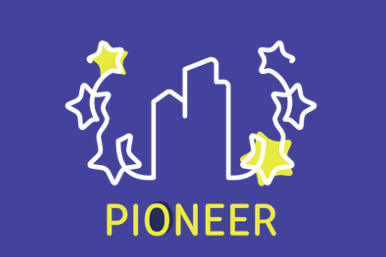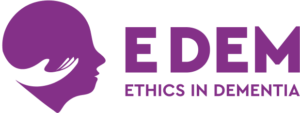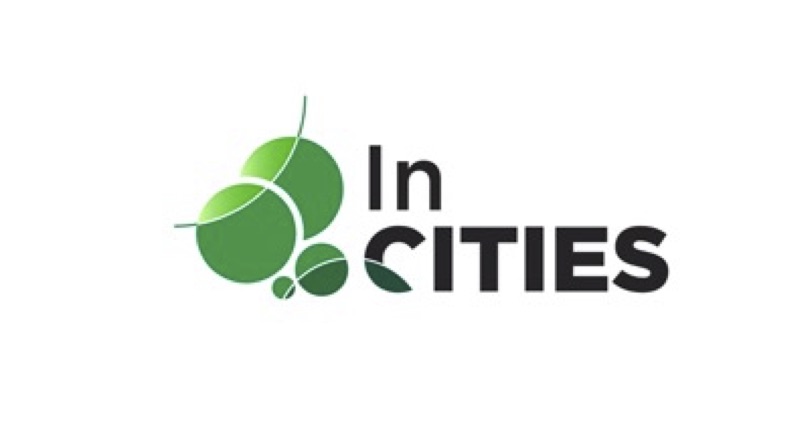A Universidade Europeia das Cidades do Futuro
Investigadora
A PIONEER é uma aliança de Universidades Europeias dedicada ao ODS 11 “Cidades e comunidades sustentáveis”, que aborda a necessidade de as cidades se tornarem inclusivas, seguras, resilientes e sustentáveis. A aliança reúne 10 universidades orientadas para o impacto, incluindo um parceiro suíço associado, e abrange 32 cidades e 16 regiões em toda a Europa.
Ao reunir académicos, instituições públicas, organizações privadas e cidadãos no nosso quadro de orquestração, desenvolveremos iniciativas conjuntas de educação baseada em desafios, investigação orientada para o impacto e co-criação de inovação que contribuam para muitas agendas europeias, regionais e urbanas, como o Pacto Ecológico da UE e o pacote “Fit for 55”. Para o efeito, a PIONEER será também um facilitador da aprendizagem inter-institucional e um instrumento de mudança institucional. Alcançaremos esta ambição através da integração estratégica a nível institucional: alinhando gradualmente as nossas estratégias individuais e trajectórias institucionais, construindo uma estratégia de desenvolvimento comum para nos tornarmos instituições verdadeiramente internacionais integradas num quadro federal.Este quadro será inspirado na União Europeia, com um centro estratégico forte que se baseia e apoia a diversidade e a autonomia dos nossos parceiros para construir um ecossistema académico flexível e complementar, trabalhando em conjunto numa estratégia e numa trajetória de desenvolvimento comuns. Empenhados em difundir os valores europeus e em promover a inclusão e a diversidade, o PIONEER Open Campus oferecerá mobilidade sem descontinuidades aos estudantes e oportunidades únicas de desenvolvimento de liderança ao pessoal académico e não académico.
O nosso Centro de Conhecimento permitirá às universidades membros e a mais de 40 parceiros associados de ecossistemas regionais trabalharem em conjunto em questões relacionadas com o ODS 11.
Developing an intercultural game as a pedagogic tool for the inclusion of pupils with migrant bacKground in new Learning environments
Investigadora
The KiDLE project aims to support the inclusion of migrant children/pupils in new school environments by co-creating 5 intercultural board games and integrating them into a digital gaming pack. The project seeks to build educators' and parents' capacity to use games for children's learning and development, implement the gaming pack through gaming events, and raise awareness about the role of cross-cultural games in early childhood education towards supporting inclusion.
Ethics in Dementia (EDEM)
Coordenadora Local
The main aim of the Ethics in Dementia (EDEM) COST Action is to reduce burnout and moral distress among caregivers and promote the dignity, autonomy, and quality of life of people with dementia.
Dementia is a health challenge on the rise. The overall number of people with dementia in Europe is expected to almost double from 1.57% of the population in 2018, to 3% in 2050. There is no effective treatment for any of the 200 known dementia diseases. It is not possible to halt or reverse the cognitive decline caused by dementia.
This makes care the most important health intervention for people with dementia. However, there are profound ethical difficulties involved in caring for people with dementia. Their gradual cognitive loss complicates retainment of autonomy and agency, and causes a number of ethical care dilemmas, including: balancing safety with freedom, deciding what is in their best interests and recognising that the needs of the person with dementia may sometimes conflict with the needs of others who also deserve consideration. Legal frameworks and guidelines are helpful in guiding practice and decision-making, but they need to be interpreted and applied to specific situations.
EDEM addresses this challenge. By involving a multitude of stakeholders in developing an ethical framework, recommendations and an educational toolkit available for use across Europe, EDEM aims at improving dignity, autonomy and quality of life of people with dementia, as well as reducing burnout and moral distress among caregivers.
Action keywords
Dementia - Ethics - Autonomy - Dignity - Person centered care
Trailblazing Inclusive, Sustainable and Resilient Cities
Investigadora
O projecto InCITIES foca-se nas cidades do futuro: resilientes, sustentáveis e inclusivas. Este projecto é financiado pela Comissão Europeia, através do Programa Quadro Horizonte Europa, lançado, no contexto da European Excellence Initiative.
InCITIES promove e desenvolve iniciativas no âmbito da investigação, do ensino e no relacionamento com a sociedade envolvente.
InCITIES reflete os desafios globais europeus para as cidades do futuro abordando quatro objetivos:
Mapear estratégias de transformação institucional para universidades baseadas em investigação, progressivamente mais sustentável, incrementando a ciência aberta e oportunidades de carreira,
Fortalecer uma rede de longo prazo das instituições de ensino superior e de investigação participantes e os ecossistemas circundantes com base em hubs integrados de conhecimento,
Aumentar a capacidade científica, tecnológica e de pessoal, partilhando as melhores práticas pedagógicas, de pesquisa, de gestão e administrativas no consórcio,
Promover as competências digitais, criando uma plataforma de educação aberta e inovadora em sinergia com a agenda de investigação, desenvolvimento e inovação do projecto, com foco nas cidades inclusivas, sustentáveis e resilientes.
Os parceiros do consórcio representam universidades de cinco países (Portugal, Eslováquia, Finlândia, França e Alemanha), que asseguram as competências e os conhecimentos relevantes para a implementação do projecto.
Além do Iscte, o consórcio integra os seguintes parceiros universitários: Universidade de Zilina (Eslováquia), Universidade de Ciências Aplicadas de Colónia (Alemanha), Universidade Gustave Eiffel (França) e Universidade de Ciências Aplicadas Laurea (Finlândia).
Os parceiros associados do projecto são: Área Metropolitana de Lisboa, União das Vilas e Cidades da Eslováquia, Mobilidade Inteligente da Eslováquia, Confederação Portuguesa do Voluntariado, Confederação Portuguesa das Colectividades de Cultura, Recreio e Desport...
Informação do Projeto
2022-10-01
2025-09-30
Parceiros do Projeto
- Iscte - Líder
- TH KOLN - (Alemanha)
- LAUREA - (Finlândia)
- UNI EIFFEL - (França)
- UNIZA - (Eslováquia)
Slow Memory: Transformative Practices for Times of Uneven and Accelerating Change (SlowMemo)
Coordenadora Local
We are living in times of deep contradictions. While our world accelerates and grows smaller through superfast digital networks, it is also marked by widening socio-economic disparities. We face viral pandemics, rapid species extinction, increased automation of work, quick fixes for mental health, political upheavals and displacements of old certainties. Adaptation and resilience to these challenges must draw on past experiences and cultural resources – this can only happen if we slow down and take time to remember well. This Action addresses the need for increased interdisciplinarity in our understanding of how societies confront their past to contend with environmental, economic and social changes brought on by sudden events and by slow and creeping transformations. The future of peace, prosperity, politics, work and climate will depend upon how we remember socio-cultural and political changes. Transformative practices of remembrance – as objects of study and as critical interventions – will be shared collaboratively across Arts and Sciences in order to reveal the ways in which humans confront large-scale processes of change. This Action will uniquely focus the attention of scholars, policymakers and cultural professionals on alternative paths to build resilience in the face of contemporary rapid-response culture. Through transnational and interdisciplinary discussions, we will address urgency, emergency, crisis and acceleration by drawing together the ‘multi-sited’, ‘eventless’ and slow-moving phenomena that can best be studied by ‘slowing down’ our research methods, to afford capacity building, knowledge generation and impact activities. Inspired by ‘slow science’ (Stengers 2018), we seek an alternative kind of social remembering.
Action keywords
memory and heritage studies - oral history - inequality - political culture - democratic governance
“Wearable Robots for augmentation, assistance or substitution of human motor functions”
Coordenadora Local
Wearable Robots (WRs) is an emerging field of personal devices that are integrated parts of human functioning, and that are constructed of typical robotic components such as actuators, sensors and control algorithms. Where conventional robots were typically intended for use in industrial environments to help in tedious and repetitive tasks and tasks requiring high precision, the situation is currently evolving to one where there is an increasing direct physical interaction between robot and human operator. The interaction with humans in WRs is not only physical, but also includes cognitive aspects, as in the interaction, control of functions is typically shared by human and machine. WRs can be used either to augment, train or supplement motor functions or to replace them completely. Wearable Robots operate alongside human limbs, as is the case in orthotic robots, exoskeletons or robotic suits. WRs are expected to find applications in Medical, Industrial and Consumer Domains, such as neuro-rehabilitation, worker support, or general augmentation. As WRs continuously interact with humans in multiple situations, Human Robot Interaction, Ergonomics, and Ethical, Legal and Societal (ELS) considerations, as well as early involvement of stakeholders are of essential interest. This Action focuses on the European integration of different underlying disciplines in science and engineering, as well as on engaging of stakeholders to improve WR technology and its societal impact.
Action keywords
Wearable Robots - Physical Human Robot Interaction - Human Motor Control - ELS Aspects - Quality of Life
The digital literacy and multimodal practices of young children (DigiLitEY)
Coordenadora Local
The ability to negotiate digital forms of literacy carries high stakes for life destinations but in early childhood education, literacy still tends to be approached as predominantly print-based. The technologies through which children now engage with all forms of knowledge are constantly changing with the widespread use of an array of digital, interactive, converged and personalised devices. These are transforming the skills and literacies needed by even the youngest children to be competent actors in the world while, at the same time, challenging the efforts of parents and teachers to support their learning. The development of relevant skills and knowledge for reading and writing contemporary texts is crucial for educational, economic, social and cultural progress in Europe. The proposed Action will create an interdisciplinary network to examine how young children
Action keywords
digital literacy - early childhood - multimodality - media literacy - new technologies
Lembrar para não Esquecer
Coordenadora Local
A contribuição deste projeto para a resolução dos problemas associados à doença de Alzheimer enquadra-se numa perspetiva não farmacológica, através do desenvolvimento de uma aplicação informática. Os objetivos da aplicação informática são predominantemente dois: - ajudar os profissionais de saúde (médicos, enfermeiros, auxiliares de saúde, etc.) a acompanhar a evolução da doença em doentes já diagnosticados; - ajudar os doentes através da realização de jogos que auxiliem a estimulação das suas capacidades cognitivas (através de elementos textuais, ou multimédia). A aplicação a ser desenvolvida, chamada MEM+ pressupõe que o doente se encontra num estado intermédio da doença, i.e., o doente ainda consegue andar, reconhecer pessoas e associar palavras a cores e objetos. Esta solução consistirá no desenvolvimento de uma aplicação informática, com a capacidade de gerar questionários, com base nas experiências de vida do doente, de forma a testar e estimular a sua memória. Serão também gerados relatórios com base nos resultados dos questionários. A aplicação permitirá inserir uma representação da vida do doente, os eventos por que passou (com as pessoas e locais relacionados) e as pessoas que fazem ou fizeram parte da sua vida. Com base na informação recolhida serão definidos grupos de memórias, com base nos quais, serão gerados questionários estruturados. Através da resposta a questionários pretende-se estimular a memória, tentando travar a evolução da doença, e ao mesmo tempo serão recolhidos dados que permitirão representar/estudar a evolução da doença num grupo amplo de pacientes ao longo de um período de tempo. Estas perguntas beneficiarão da introdução de conteúdos multimédia, e o relatório final providenciará ao doente uma história que relata os eventos da sua vida que foram abordados naquele questionário. Em termos tecnológicos, esta aplicação proporcionará a possibilidade de aplicar conceitos inovadores de Inteligência Artificial num ambiente distinto com objetiv...
Informação do Projeto
2013-11-01
2018-12-30
Parceiros do Projeto

 English
English





